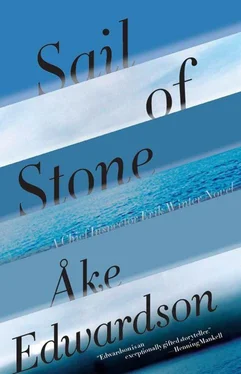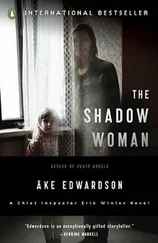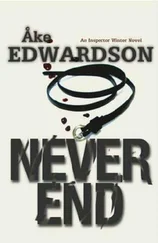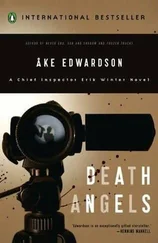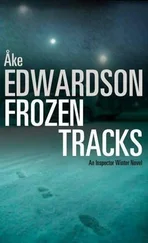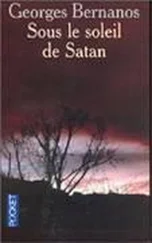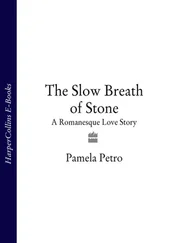Victorian again. Winter saw another time in his mind’s eye. Horses, riders, a different and stronger scent in the air.
“No good going down there now,” said Macdonald.
Ross had told them that Dallas Dhu Distillery was closed on Tuesdays. He had said that he could arrange a visit anyway. Macdonald had looked at Winter. Did they have time? They didn’t, really. They were on their way to Dallas, and Aberdeen, and maybe other places.
“We’ll do it next time, Jake,” Macdonald had said.
“Ross has plans to open the place again,” Macdonald said, driving through a sharp curve. “He’s really far gone, actually.”
“Was that what he meant about giving me a job?” Winter said.
“You never know,” said Macdonald, letting out a laugh. “Interested?”
“You never know,” said Winter.
“Everything is actually in good order down there,” said Macdonald. “It would only take four or five weeks to get it up and running again.”
“Mmhmm.”
“I hope Ross fixes it up. The whisky is really very good.” He flung his hand out. “It’s the valley and the water, and the wind. The grain in this region is special.”
“I would like to buy a few bottles while I’m here,” said Winter.
“We’ll do it on the way home,” said Macdonald.
There would not be any such way home.
Winter saw a cluster of trees again, like a platoon on its way to the castle.
Everything looked peaceful, but this was a violent region, wild. Steve had told him about all the violent men there were and had been per square mile in Moray and Aberdeenshire. Blood flowed under the soil.
They drove in a long arc, past Branchill. Macdonald played Little Milton at a high volume, another of the forgotten black masters. “Let Me Down Easy”: I gave you all my love, don’t you abuse it, I gave you tender love and care, oh baby don’t you misuse it. He had played Joe Simon, O. V. Wright.
They drove past a black church behind a black cemetery on a low hill. Macdonald lowered the volume. Winter saw the sign on the side of the road: Dallas. There were low houses on either side, small cottages with plaster walls that had cracked here and there. The fourth building on the right side was a closed-down gas station with the VALIANT sign with the picture of the prince. The pumps were still there, like something out of a rusty film from the fifties. A wrecked RV was leaning against the gas station, which was missing windows. There was junk everywhere. The image reminded Winter of the shipyard in Buckie.
Diagonally across from that was Dallas Village Shop and Post Office. Macdonald parked the car and they got out. He cast a glance at the ruins of the gas station and then at Winter.
“The first impression is important,” he said, nodding across the street.
“I suppose it has looked different,” said Winter. “And I like the melancholy.”
“It was melancholy even when the pumps worked,” said Macdonald.
Winter looked down the street. Dallas was a single straight street, or road, with a single row of houses on each side. That was all. The association was obvious.
“Looks like something out of the Wild West,” he said.
“Naturally,” said Macdonald.
Winter smelled smoke from a fire in the air. He didn’t hear any sounds, but then he heard a dog barking. There were no people out. There were three cars parked a hundred yards farther up the road. Winter thought he heard a cement mixer start up. It was two o’clock in the afternoon, and the sun broke through and it suddenly became warm. Winter could see silhouettes of mountains around the hollow of the valley.
“Might as well show you our supermercado too,” Macdonald said. “Now that you’ve seen the gas station.” He took a step. “Then you will have seen everything.”
The country store/post office was in a little bungalow of red brick, and it was closed. There was a sign in the window that said “Dallas-the Heart of Scotland” and “Open 10-1, 4-6.”
“The heart is closed for us,” Macdonald said.
Through the window Winter could see a stack of cans, a pile of papers, candy, a small counter, and a small cash register.
They walked back in the sunshine and got into the car. Macdonald drove down the street and it took two minutes. They passed a construction site. The cement mixer Winter had heard was on. The three construction workers turned toward the car. Macdonald stretched his arm through the open car window. One of the men raised his hand.
They were through, and they stopped at an intersection.
This was the end of the world. If Winter had been anywhere that might be the End of the World, this was it. The ironic name; that was part of it. A wild name, here and there. Dallas. Dallas, Texas. Dallas, Moray. Dallas, Scotland. It made him think of the film Paris, Texas. The same feeling of tragic irony, a play on associations with names that stood for completely different things. Or not.
Macdonald turned right onto a gravel road and drove up to the house and stopped the car. There were several buildings on the plot of land. Chickens were running around in the yard. Winter saw three hunting dogs in a kennel. The dogs hadn’t barked a single time. There were two modern Ferguson tractors with muddy back wheels alongside the wall of a barn.
A golf bag was leaning against one of the tractors.
Winter saw the club handles sprawling against the cow shit on the tires. Maybe not a common sight on a farm in backwoods Sweden. But here. People played golf the way the Swedes took nature walks. Along the roads in Scotland, Winter had seen many golfers, men, women, in tweed, in rags, old, young, healthy, disabled, in wheelchairs, like something out of P. G. Wodehouse’s golf stories. And now-golf clubs and manure. A man stepped out of the barn. He had on a cowboy hat.
“This is it,” Macdonald said, turning off the ignition, and Little Milton was cut off in the middle of another relationship problem.
Lucinda Williams was cut off in the middle of an attempt at consolation. Blue is the color of night. Halders turned off the CD player when the telephone jangled out a ring that he’d forgotten to turn down.
“The guys are here now,” said Aneta.
“Good.”
“Something else has happened.”
“What?”
“Forsblad’s sister just called.”
“She has your number?” asked Halders.
“I gave it to her.”
“Hmm.”
“The important thing is what she said. She said that she wants to talk to me about ‘things you don’t know.’”
“She probably wants to back her brother up,” said Halders.
“She also asked if I had seen Anette in the past few days.”
“And?”
“If I knew how she looked,” said Aneta.
“What does that mean?”
“That means that I’m going to her place to hear what she has to say,” said Aneta.
“Have you looked for her? Anette?”
“No one answered at any of the numbers.”
“Ask one of the guys to drive you to Älvstranden,” said Halders.
“I will.”
“And to wait there for me while you’re chatting with the gal.”
“I’ll ask.”
“Who’s there?” asked Halders. “Let me have a word with someone.”
“Bellner is standing next to me and eavesdropping,” said Aneta. “Ask nicely.”
“Of course, what do you think?” said Halders, waiting to hear Bellner’s voice.
“Listen up, Belly, if it isn’t too much fucking trouble,” Halders said when Bellner had said hi in his pleasant voice.
Susanne Marke looked jumpy, or maybe it was the light, which never seemed to be natural this close to the river and the city lights on the other side. The light moved across her face like nervous twitches of her skin. In the window behind her, Aneta could see one of the Denmark ferries passing. It looked like it was only ten yards away.
Читать дальше
